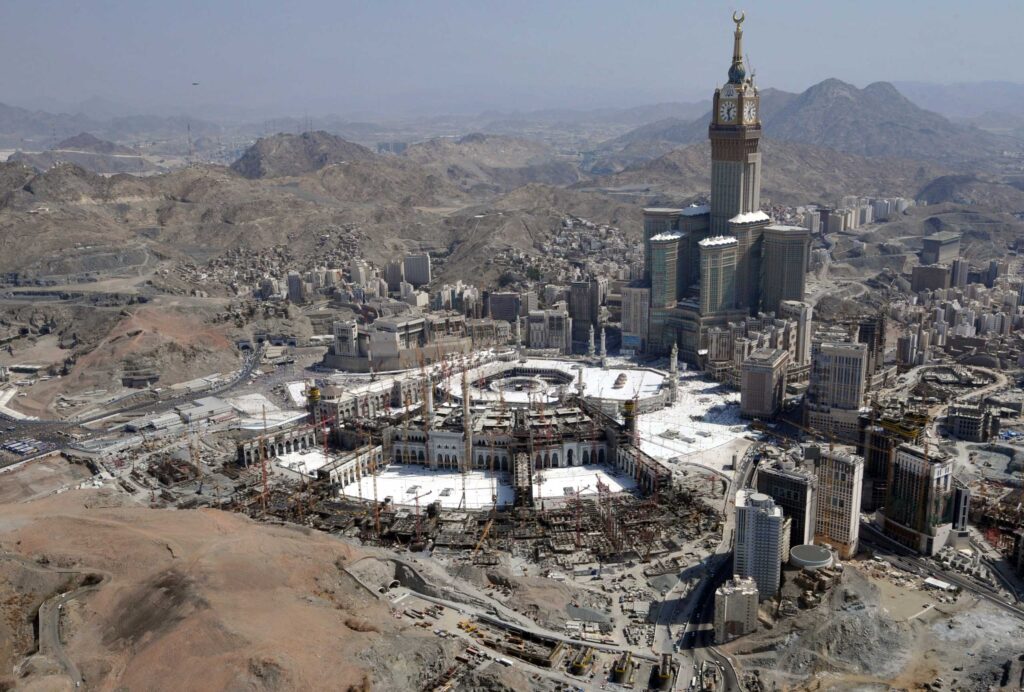One Day In The Haram is a thoughtfully produced masterpiece. It’s an intricate stream of cinematic excellence from the dramatic aerials of Makkah to the insides of the Haram leading us to the foot of the Kabba.
For those who are not Muslim, it is our only glimpse into the profundity of this sacred city where Muhammad – “peace be upon Him” laid down the messages of Allah. The narrator gives power with his enunciation and dictation to an already overpowering story of the messenger Muhammad sent by God to what would inevitably become the holiest city to Muslims the world over.
Every muslim is obliged to make the pilgrimage here at least once in his or her life. The Haaj as it is called is the yearly pilgrimage to Makkah that draws millions of Muslims to the Haram and the sacred cube known as the Kabba.
Eloquently narrated prophetically insightful he tells us, “as worshippers near the Kabba the sense of awe is palpable.” And it’s sincere beyond belief how through the screen you can sense and feel the power of this sacred space of worship going back one thousand four hundred years.

The prophet Muhammad spread the message of Islam from this very place and from here to took root all over the Arab world becoming the second largest religion in the world.
It’s the first few minutes alone that give you an idea of the grandeur of this holy city, one of the holiest and certainly the holiest place – The movie begins with “MashaAllah” – meaning expressing gratitude to God.
We’re told, “The Prophet said Allah had made this city sacred the day he created the heavens and the earth and it’s sanctity shall remain until the day of judgement.”
The preaching of Muhammad spread from this holy place. And irrespective of religion or creed one has to honor for the magnitude of it’s legacy. Muhammad’s prophet spread from this space where the Kabba sits and draws in millions each year.
Only Muslims are allowed to enter the city and perhaps it’s this notion that has an even greater draw or yearning to be understood, seen, felt.
MONOTHEISM
Believing there to be only one God. The irony here for many of the major religions is taking this belief and idea out of context. Several of the major religions are based in the theory of one single God and each one of them professes such, but then discredits the others.
They all prophesize the same thing. There is one God and each and every one of them are saying the same thing however it is being told in its own place, its own time, its own language by a messenger that looks like its own people.
How would this message resonate for people in one part of the world where they do not understand the language or the messenger looks nothing like them?
However monotheism suggests the belief of one God.
And when we do the math and calculations we can clearly see each messenger, Messiah of that one God is saying the same thing. When Jesus says, “I am the God and the Savior.” He is speaking the message of God, but it is taken out of context as if he were saying He is God.
The same goes for the other religions however the other religions do not claim their messenger to be God himself, but a Messiah. Muhammad was the messiah who was sent by God to deliver the message of Allah which means God. It is said that Muhammad, the messenger was sent to teach specifically monotheism and the teachings of Adam, Abram, Moses, Jesus and other prophets.
THE WORLD’S MAJOR RELIGIONS
The below facts are up for debate. The numbers are not an exact representation and are even inaccurate in some sense of the word.
The numbers themselves will continue to fluctuate as missionaries of the Christian faith continue ordaining people to their faith and as other religions particularly Sikhism continue to gain followers in exponential ways. While it is the newest religion it is also the fastest growing.
Also the numbers here are based on research and data and hold no merit to the actual beliefs or prophecies and are not representative of time and hold no precedence in the order.
They are simply numbers that represent followers of each major religion.
- Christianity (31.2%)
- Islam (24.1%) – the second largest
- No religion (16%) – those not claiming any religion
- Hinduism (15.1%) – the oldest religion – the holy trinity was born here – birth of the oldest religious texts in the world – the rig veda came before the Torah
- Buddhism (6.9%) –
- Folk religions (5.7%) –
- Sikhism (0.29%) – the fastest growing –
- Judaism (0.2%) – the Torah written by Moses himself was thought by some to be the oldest, however science based evidence has proven the Rigveda to be the oldest scripture in the world.








